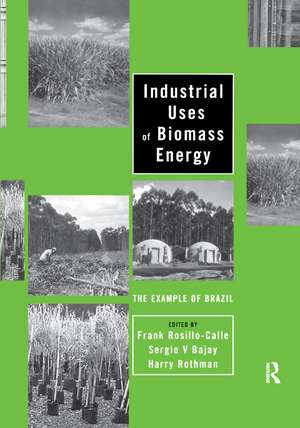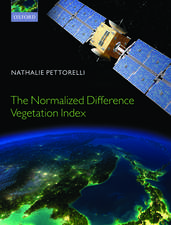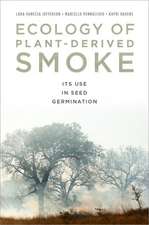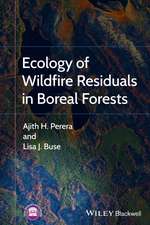Industrial Uses of Biomass Energy: The Example of Brazil
Editat de Frank Rosillo-Calle, Sergio V. Bajay, Harry Rothmanen Limba Engleză Paperback – 16 sep 2019
This book is an interdisciplinary, multi-author work, based upon a recently completed international study by Brazilian and British experts and will prove a valuable reference to all those working in this field.
| Toate formatele și edițiile | Preț | Express |
|---|---|---|
| Paperback (1) | 495.83 lei 6-8 săpt. | |
| CRC Press – 16 sep 2019 | 495.83 lei 6-8 săpt. | |
| Hardback (1) | 1554.33 lei 6-8 săpt. | |
| CRC Press – 9 mar 2000 | 1554.33 lei 6-8 săpt. |
Preț: 495.83 lei
Preț vechi: 583.33 lei
-15% Nou
Puncte Express: 744
Preț estimativ în valută:
94.89€ • 103.03$ • 79.71£
94.89€ • 103.03$ • 79.71£
Carte tipărită la comandă
Livrare economică 22 aprilie-06 mai
Preluare comenzi: 021 569.72.76
Specificații
ISBN-13: 9780367398866
ISBN-10: 0367398869
Pagini: 304
Dimensiuni: 178 x 254 x 15 mm
Greutate: 0.64 kg
Ediția:1
Editura: CRC Press
Colecția CRC Press
ISBN-10: 0367398869
Pagini: 304
Dimensiuni: 178 x 254 x 15 mm
Greutate: 0.64 kg
Ediția:1
Editura: CRC Press
Colecția CRC Press
Public țintă
Academic and Professional Practice & DevelopmentCuprins
1. Overview of biomass Energy David O. Hall, Jo I. House and Ivan Scrase 2. Energy from biomass in Brazil Sergio Valdir Bajay, Eliane Bezerra De Carvalho and André Luis Ferreira 3. Potential contribution of technology assessment to bioenergy program Harry Rothman and André Furtado 4. Externalities Ausilo Bauen 5. Sugar cane culture and use of residues Oscar A. Braunbeck and Luis A.B. Cortez 6. Sugar cane industiral processing in Brazil Isías de Carvalho Macedo and Luís A.B. Cortez 7. Pulp and paper Sergio Valdir Bajay, Mauro Donizeti Berni and Carlos Roberto de Lima 8. Production and use of industrial charcoal Frank Rosillo-Calle and Guilherme Bezzon 9. New technologies for modern biomass energy carriers Arnaldo Walter et al. 10. Conclusions and future directions Frank Rosillo-Calle Ferreira, State University of Campinas, Brazil, Andre Futardo, State University of Campinas, Brazil, Ausilio Bauen, King's College, London, UKF, Luis Cortez, State University of Campinas, Brazil, Isaias Macedo, Copersucar Technology Centre, Brazil, Mauro Berni, State University of Campinas, Brazil, Guilherme Bezzon, State University of Campinas, Brazil, Arnaldo Walter, State University of Campinas, Brazil, Jose Roberto Moreira, Biomass Users Network, Brazil, Frank Rosillo-Calle, King's College, London, UK, Sergio Valdir Bajay, State University of Campinas, Brazil, Harry Rothman, University of the West of England, UK, Richard Bain, National Renewable Energy Laboratory, UK, Kevin Craig, National Renewable Energy Laboratory, UK, Ralph Overend, National Renewable Energy Laboratory, UK, Andre Faaij, Utrecht University, Netherlands, Oscar Baunbeck, State University of Campinas, Brazil, Eliane Bezerra de Carvalho, Brazilian Regulatory Agency, Brazil, Jo House, King's College, London, UK, Carlos Roberto de Lima, University of Paraiba, Brazil, Jose Dilcio Rocha, National Renewable energy Laboratory, USA.
Notă biografică
Frank Rosillo-Calle , Sergio V. Bajay , Harry Rothman
Descriere
Industrial Uses of Biomass Energy demonstrates that energy-rich vegetation, biomass, is a key renewable energy resource for the future. Most energy scenarios recognise bioenergy as an important component in the future world's energy outlook, both in developed and developing countries. Brazil, uniquely, has a recent history of large-scale biomass industrial uses that makes it a specially important test-bed both for the development of biomass technology and its utilisation, and for understanding how this is shaped by political and socio-economic forces. Perhaps their most famous development was PROALCOOL, the national programme for producing fuel for the nation's automobiles from alcohol derived from sugar, as a substitute for petrol. But other sectors of the Brazilian economy traditionally, and presently, use biomass as a major energy source. The book analyses the cause for this and the alternatives. Finally, it is argued that Brazil's experience with the development for industrial biomass use provides wider lessons and insights in the context of the international movement for sustainable economic development.
This book is an interdisciplinary, multi-author work, based upon a recently completed international study by Brazilian and British experts at the Interdisciplinary Centre for Energy Planning-NIPE, State University Campinas and King's College, University of London.
This book is an interdisciplinary, multi-author work, based upon a recently completed international study by Brazilian and British experts at the Interdisciplinary Centre for Energy Planning-NIPE, State University Campinas and King's College, University of London.











